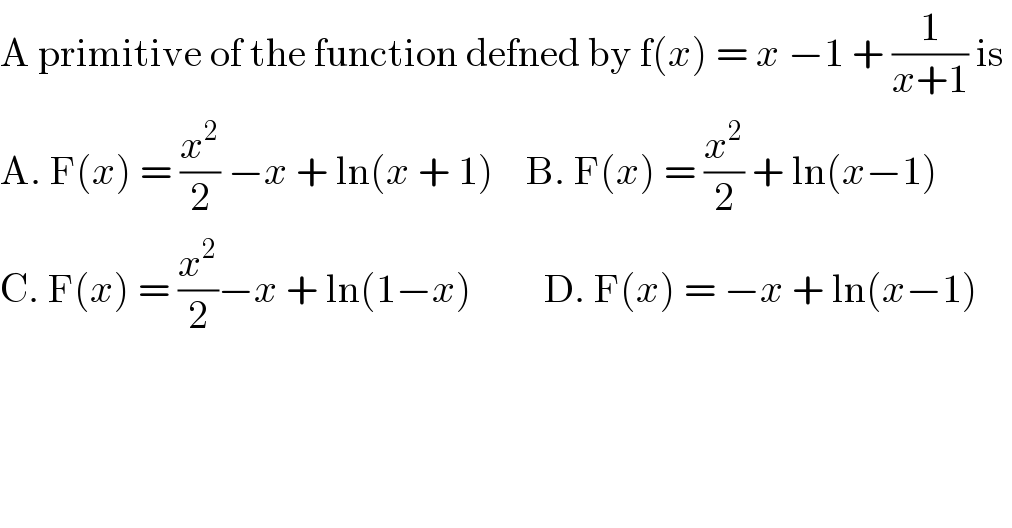
Question Number 85982 by Rio Michael last updated on 26/Mar/20

$$\mathrm{A}\:\mathrm{primitive}\:\mathrm{of}\:\mathrm{the}\:\mathrm{function}\:\mathrm{defned}\:\mathrm{by}\:\mathrm{f}\left({x}\right)\:=\:{x}\:−\mathrm{1}\:+\:\frac{\mathrm{1}}{{x}+\mathrm{1}}\:\mathrm{is}\: \\ $$$$\mathrm{A}.\:\mathrm{F}\left({x}\right)\:=\:\frac{{x}^{\mathrm{2}} }{\mathrm{2}}\:−{x}\:+\:\mathrm{ln}\left({x}\:+\:\mathrm{1}\right)\:\:\:\:\mathrm{B}.\:\mathrm{F}\left({x}\right)\:=\:\frac{{x}^{\mathrm{2}} }{\mathrm{2}}\:+\:\mathrm{ln}\left({x}−\mathrm{1}\right) \\ $$$$\mathrm{C}.\:\mathrm{F}\left({x}\right)\:=\:\frac{{x}^{\mathrm{2}} }{\mathrm{2}}−{x}\:+\:\mathrm{ln}\left(\mathrm{1}−{x}\right)\:\:\:\:\:\:\:\:\:\mathrm{D}.\:\mathrm{F}\left({x}\right)\:=\:−{x}\:+\:\mathrm{ln}\left({x}−\mathrm{1}\right) \\ $$$$ \\ $$
Commented by Serlea last updated on 26/Mar/20

$$\mathrm{Taking}\:\mathrm{the}\:\mathrm{integral},\:\mathrm{it}'\mathrm{s}\:\:\mathrm{A} \\ $$
Commented by jagoll last updated on 26/Mar/20

$$\mathrm{F}\left(\mathrm{x}\right)\:=\:\int\:\left(\mathrm{x}−\mathrm{1}+\frac{\mathrm{1}}{\mathrm{x}+\mathrm{1}}\right)\mathrm{dx} \\ $$$$=\:\frac{\mathrm{1}}{\mathrm{2}}\mathrm{x}^{\mathrm{2}} −\mathrm{x}+\:\mathrm{ln}\:\left(\mathrm{x}+\mathrm{1}\right) \\ $$
